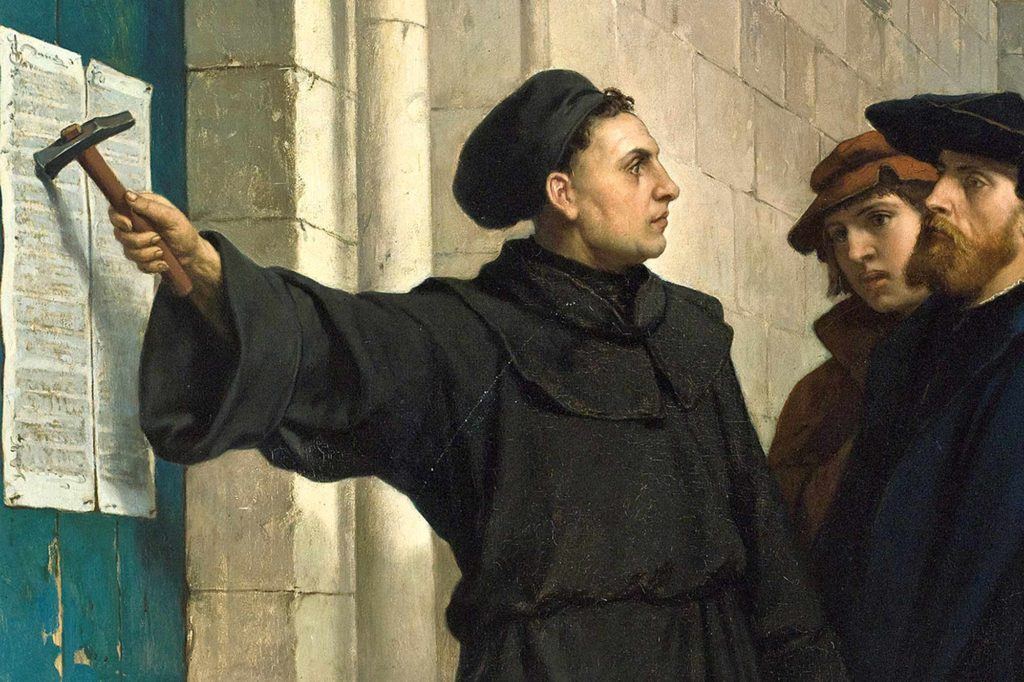The Schlosskirche in Wittenberg, Germany — the Church where Martin Luther did not nail his 95 theses. Credit: Ralf Hirschberger/DPA/PA Images

As anniversaries go, this is a big one: the 500th anniversary of the event that started the Reformation, when Martin Luther nailed his 95 theses to the door of the church in Wittenberg. Except he didn’t. The dramatic gesture was only claimed in 1546, nearly 30 years after the event. Philip Melancthon, Luther’s disciple, observed in the preface to the second volume of Luther’s Collected Works, that “Luther, burning with pious zeal, issued to propositions on indulgences… And on the eve of the Feast of All Saints 1517 he publicly posted them up on the church that is next door to the castle in Wittenberg”. Duly, it is here that the German evangelical church is holding its celebrations to mark half a millennium of the Reformation.
But there is no evidence that Luther did anything of the sort. The Augustinian friar actually mailed his propositions for a public disputation to the Archbishop of Mainz, who sat on them for a month or so. The debate about his theses really took off at the beginning of 1518, an altogether more prosaic turn of events.
It may not have been as dramatic – and nailing propositions to the church would have been a normal way of publicising the event – but in a way, the tradition is imaginatively truthful: the Reformation wouldn’t have happened without Luther, and his theses about indulgences are significant in that they foreshadow some of the radical and transformative theology which has left an abiding mark on European thought.

So what was it about Luther’s thought that was radical to the point it changed Europe? Well, one of the most significant effects of his theology wasn’t apparent in the theses, which were of course in Latin. His translation of the Bible into the vernacular formed the German language to an even greater extent than the King James’ bible changed English. He is the father of Protestant music: without Luther, we wouldn’t have hymns as we know them (carols were a medieval tradition, and rather different), and we wouldn’t have Bach. Lutheran music was grounded on his theology: the word of God, intelligible to all. It’s had a profound effect on our cultural sensibility.
But the theology that produced these things was even more important for our modern way of thinking. What was it about that thought that mattered? There were several aspects, but the crux was that Luther insisted on the certainty of salvation on the part of the individual, and that grew out of his doctrine of justification by faith – not works. So a serene self-confidence replaced the anxious striving of earlier Christians to deserve heaven through good works, prayer, charity, the sacraments and the intercession of the saints.
In Luther’s take on things, human good deeds were not just radically flawed and inadequate but almost sinful in that they suggested that Christians could earn salvation. This was wholly at odds with the old Catholic idea that God does not reject our efforts to do good. Grace and salvation became something passive, something done to you, not something active, as the Reformist slogan ‘faith without works’ suggests. That was a profound psychological change.
Then there was Luther’s insistence on sola scriptura, the unmediated word of God in scripture. He insisted the Bible should be taken in its most plain and obvious sense, which should be open to all. Yet it was obvious that Christians would have differing views on ambiguous or fraught passages in the Bible, and one thing that the history of Protestantism has shown is that the meaning and interpretation of scripture is anything but plain or obvious.
But the implications of this were profound. As Richard Rex pointed out in the Meaning of Martin Luther,
“the exaltation of the word of God above all human authority necessarily conferred upon each and every person the right and duty to work out for themselves what the Word of God might actually mean… and deciding just which of the competing plain meanings of scripture was the authoritative one.”
The effect was, he says, to exalt private judgment in a way that Luther never actually intended. One of the effects of this was to create what we would now call individualism. The modern Western sense of the self owes much to Luther, even if secular Europeans have discarded almost every other aspect of his legacy.
In political terms, the most striking aspect of Luther’s thought was his exaltation of secular rulers. He took a famously ruthless approach to the Peasants’ revolt of 1524, most notably in his pamphlet ‘Against the Thieving, Murderous Hordes of Peasants,’ describing their rebellion as a betrayal of the gospel. He invited German lords to take a bloody revenge on their serfs ”so anyone who can ought to strike, pierce or slaughter them, secretly or openly…” In the short term, it helped ensure the survival of his own theological rebellion.
More profoundly, though, it helped shore up the authoritarianism of secular rulers. His eventual scriptural justification for princely rule was that it was derived from the fourth commandment to honour your father and your mother. Henry VIII was only one king who warmed to the idea of princes appropriating the authority formerly possessed by the church. Giving authoritarianism this rationale has, to put it mildly, had unfortunate repercussions in Germany’s own history. It’s also worth remembering that Luther was famously anti-Semitic, even for his time. That had repercussions, too.









Join the discussion
Join like minded readers that support our journalism by becoming a paid subscriber
To join the discussion in the comments, become a paid subscriber.
Join like minded readers that support our journalism, read unlimited articles and enjoy other subscriber-only benefits.
Subscribe